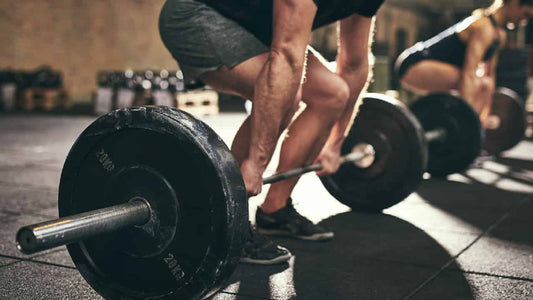It's hard to find the motivation to work out if your muscles are still sore from your last workout. Muscle recovery is arguably the most important part of your workout routine and can mean make or break if you are trying to gain muscle!
Muscles get sore post-workout because, during a workout, you are actively breaking down your muscles to make new, stronger muscles. The more you work out and push your muscles, the more muscle damage will occur.
But, if you continuously break down muscles without ever giving them the chance to recover, you can end up losing muscle and potentially causing injury instead of gaining stronger muscle.
Keep reading to see our top 7 supplements to support muscle recovery!
Top 7 Supplements to Support Muscle Recovery
1. Protein
Protein is made up of amino acids. These amino acids are what help make your muscles grow and rebuild.1 Amino acids are actually known as the building blocks of protein!
This is why protein is so important for your muscles. Post-workout, you should be trying to consume adequate protein to give your muscles the amino acid building blocks that they need to properly rebuild and recover.
Protein supplements are even more important if you don’t get enough protein from your diet, or if you are vegetarian or vegan.
Protein supplements come in the form of whey, soy, egg, rice, hemp, or pea protein. Whichever you choose all depends on your nutrition and fitness goals and preferences!
2. Branched-chain amino acids (BCAAs)
As we mentioned above, amino acids are the building blocks of protein. They are categorized as either essential or non-essential, meaning there are some that our body can naturally produce, and some that we must obtain from our diet.
BCAAs are essential amino acids, meaning we must get them from our diet because our bodies can’t produce them naturally. The BCAAs consist of isoleucine, leucine, and valine.
These, along with the amino acids we can make, aid our muscles in recovery and promote the healing of the tiny tears that exercise causes.2
Taking a BCAA supplement post-workout may help to reduce muscle fatigue, promote muscle growth, and ease sore muscles. BCAAs are also found in dairy, fish, eggs, and most meats.
3. Creatine
Much research suggests that creatine can help promote muscle recovery and growth by helping out body replenish ATP (energy) more efficiently. It has also been shown that creatine assists amino acids in muscle growth and recovery.
4. Beta-alanine (Carnosine)
Beta-alanine is another amino acid, but this one is produced naturally in our bodies to help fight muscle fatigue in the form of carnosine.
During high-intensity exercise, carnosine helps support muscle endurance and fight off fatigue so that you can keep working out harder for longer.3
The body contains a naturally low amount of beta-alanine, so to increase it, you can supplement to help increase muscle mass and support recovery. This is in conjunction with proper nutrition and a consistent exercise program!
5. Magnesium
Magnesium is a more unexplored supplement in terms of muscle growth and recovery. Though, research so far has shown that magnesium helps muscles to relax after a workout, allowing them to heal better and quicker.4
If you are deficient in magnesium, there is more of a chance that you will get muscle cramps and be sore for longer post-workout!
6. Tart Cherry Juice
Tart cherry juice is the ultimate muscle recovery supplement. Cherries are full of antioxidants and anti-inflammatories that help reduce inflammation, leading to less muscle soreness.
Tart cherry juice can also help you sleep, and a lot of muscle recovery occurs while you are sleeping because your muscles have long periods to focus solely on healing and recovery.
7. Multivitamins
While taking a multivitamin every day to support your overall health is recommended, they are also good for muscle recovery. Most include calcium and vitamin D to help support strong bones that, in turn, prevent injuries and keep muscles strong.
Vitamin A also is in most multivitamins and helps to promote muscle building by assisting amino acids.
Our top pick is Performance Lab NutriGenesis Multi, which helps to support your overall health and muscle recovery!
Conclusion
While this may seem like a long list of supplements to take for muscle recovery, there are multiple options so that you can get most of this in one or two products.
Performance Lab Immune is another supplement we recommend. Even if you take all the above supplements, eat healthily, and workout regularly, your immune system can often still need a boost.
If your immune system is weak and you are constantly getting sick, your muscles are going to suffer, and muscle recovery will be harder and longer.
Taking an immune support supplement will help you stay at the top of your game so that your body can focus on muscle recovery rather than fighting off an illness!
If you are experiencing sore muscles too often, and aren’t seeing any results in the gym, try to incorporate some of these supplements into your regimen. Supporting muscle recovery is just as important as any other part of your exercise routine, so show your muscles some love!
References
- Elisabet Børsheim, Kevin D. Tipton, Steven E. Wolf, and Robert R. Wolfe. Essential amino acids and muscle protein recovery from resistance exercise. Am Journal of Physiology-Endocrinology and Metab. 2002;283(4):E648-E657.
- Negro M, Giardina S, Marzani B, Marzatico F. Branched-chain amino acid supplementation does not enhance athletic performance but affects muscle recovery and the immune system. J Sports Med Phys Fitness. 2008;48(3):347-51.
- Roveratti, M.C., Jacinto, J.L., Oliveira, D.B. et al. Effects of beta-alanine supplementation on muscle function during recovery from resistance exercise in young adults. Amino Acids. 2019;51:589-597.
- Zhang Y, Xun P, Wang R, Mao L, He K. Can Magnesium Enhance Exercise Performance? Nutrients. 2017; 9(9):946
















